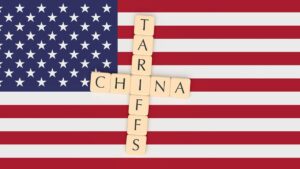MoneyTalks: Leveraging China’s self-sufficiency syndrome

All mine. Via Getty
MoneyTalks is Stockhead’s regular drill down into what stocks investors are looking at right now. We’ll tap our extensive list of experts to hear what’s hot, their top picks, and what they’re looking out for.
Today we hear from Ninety One’s Asia Pacific senior portfolio manager Charlie Dutton and analyst Mendy Zhang.
The past couple of years have been disorderly for Chinese equities, However, President Xi Jinping’s recent solidification of power provides stability, decisiveness and potential clarity regarding the CCP government’s succinction of purpose.
Ninety One’s Asia Pacific senior portfolio manager Charlie Dutton and analyst Mendy Zhang believe the trend towards localisation could be an absolute gimme for parsing out some worthwhile beneficiaries of Xi’s prioritising of domestic champions over foreign alternatives.
Driving self-sufficiency is the name and the game – with Dutton and Chen singling out several leading companies within the quality spectrum, particularly in the software, healthcare and consumer sectors.
China’s equity market has had a tumultuous couple of years, against a backdrop of heightened tensions with the US and COVID-related supply chain troubles.
The Hang Seng Index halved from February 2021 through October last year as sentiment reached a nadir.
Then the market soared circa 50% through January as the stringent pandemic measures lifted, igniting expectations China’s profound savings pool would be put to work.
Most recently, we have been in somewhat of a holding pattern, as investors digested the results of the annual nine-day gathering of the National People’s Congress, China’s legislative body.
But since Xi Jinping’s ascension to a precedent-breaking third term, surrounded by like-minded allies in top government roles, Dutton says we’ve been ‘in somewhat of a holding pattern,’ as investors digest the outcome of the annual nine-day National People’s Congress, China’s legislative body during last month’s Two Sessions.
“Importantly, new Premier Li Qiang sought to reassure the country’s private sector and also outlined policy that will focus on domestic growth and high quality development.”
Self-sufficiency: Science, healthcare and technology
Dutton and Zhang: From an investment perspective, the focus on science, healthcare and technology is especially encouraging, with these disciplines aligning with our Quality team’s approach to equity investing.
At a time when relations with the US are expected to remain fraught for the long term, we believe it would be prudent to invest in pockets of the market likely to benefit from policy tailwinds. Beijing’s drive towards self-sufficiency – ensuring that products are made or innovated in China – will inevitably impact a number of local companies.
Tech
In IT software, for instance, Kingsoft – China’s version of Microsoft – has a compelling growth runway as the government shifts users onto the company’s software, and away from early versions of Microsoft’s platform.
Another local champion is Glodon, whose software improves the safety, quality, efficiency and profitability of China’s property industry. Given that market typically operates on low profit margins of around 3%, demand for Glodon’s software, which can enable cost savings, has been strong, evidenced by its 20% annual revenue growth over the past five years.
Healthcare goals
Dutton and Zhang: The same rationale applies to the healthcare sector, with Beijing striving to become more self-sufficient in cutting edge technology such as medical devices. This would help from a national security perspective should the US ever consider export bans on medical devices, and to help continue to protect its citizens Beijing has already doubled the number of intensive care beds per 100,000 people following COVID to 10, but this falls someway short of the 25-30 available in Europe or the US.
It’s serious about catching up, whether in ICU, surgical rooms, or everyday diagnostic functions.
Medical device producer Mindray is the dominant leader with best-in-class products, technology, reputation and cost control, so it has an almost impregnable position in a structurally growing market fully backed by the government.
Further examples are plentiful.
Healthcare requires research to move forward, and in Tigermed, China already possesses one of the most prominent contract research organisations in the world.
Have a drink
In the consumer space, staples such as Fuling Zhacai and liquor producer Kweichow Moutai are in positions of strength heading into a period of extended growth.
In brief then… while China’s trend towards localisation might intuitively sound introverted, we believe the opposite could be true. An uplift in local expertise could help the country further entrench its position as an indispensable link in the global economy, with several quality sectors being notable beneficiaries.
Related Topics
UNLOCK INSIGHTS
Discover the untold stories of emerging ASX stocks.
Daily news and expert analysis, it's free to subscribe.
By proceeding, you confirm you understand that we handle personal information in accordance with our Privacy Policy.








